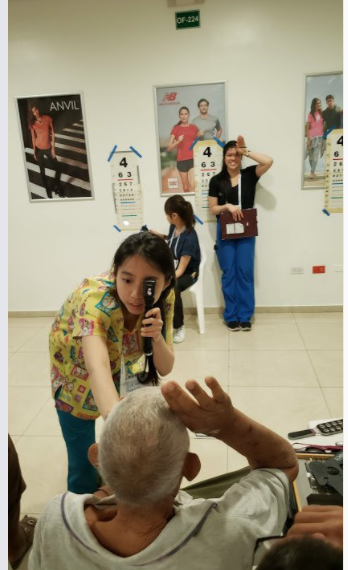President’s Insights – December 2020
Each December 3rd , the United Nations observes the International Day of Persons with Disabilities. The UN estimates that more than one billion people live with some form of disability, 80% in developing countries. Persons with disabilities, have generally poorer health, lower education achievements, fewer economic opportunities and higher rates of poverty than people without disabilities. The World Report on Vision (WHO, 2019) highlights that more than 1 billion people worldwide are living with vision impairment that could have been prevented or has yet to be addressed for conditions like short and far sightedness, glaucoma and cataract. The report, found that ageing populations, changing lifestyles and limited access to eye care, particularly in low- and middle-income countries, are among the main drivers of the rising numbers of people living with vision impairment.
That is why this date is an excellent opportunity to highlight the challenges that people with disabilities face and the role that optometry can have in improving their lives. I have a fair amount of experience with this because one day a week I work at Children’s Clinics in Tucson, Arizona. Children’s Clinics is a comprehensive outpatient clinic for children with disabilities. Many of my patients have conditions such as Down Syndrome, autism, hearing impairment, intellectual disability, Spina bifida, genetic disorders, and/or visual/ophthalmic conditions.
One major lesson we have learned from COVID-19 is the importance of reaching out, meeting, communicating, and learning through technological means such as online conferencing, e-mail, and messaging applications. When we are quarantined in our homes, or staying home to stay safe, we can reach out to our families, communities and others around the world. VOSH/International has adapted quickly to expand our technological capabilities to meet, conference, teach, and discuss. We have held several online conferences and working groups/committees are meeting more frequently than ever. And when at home on our computers or other devices, clear and comfortable vision becomes extremely important.
A person with a disability, in some ways similar to an individual quarantined at home, might face a lifetime of challenge in mobility, for example, or hearing, thereby making their sense of vision even more important for them. As optometrists and volunteers working to improve ophthalmic health and vision, we can greatly enhance and improve the lives of people with disabilities. For example, a person with a mobility disorder or health condition that limits time away from home, who also has moderate to high astigmatism, might find it difficult to read a book or use their computer. By providing spectacles for astigmatism, their world could be opened up to intellectual pursuits, education leading to certifications and degrees, interesting hobbies, and productive work. We can see inspiration in the life of Stephen Hawking, the theoretical physicist and author, who became Director of Research for the Centre for Theoretical Cosmology at the University of Cambridge, UK.
At every step we must endeavor to open up the lives of people with all types of disabilities, to enhance every capability, to improve their chances of a healthy, active, and productive life. This is especially important in lives of people with visual disabilities. The area of low vision assesses what visual capabilities exist in acuity, tracking, visual field, and mobility and then improves those capabilities using optical means, such as lenses and prisms, or vision enhancing technology.
This is important, not only as a matter of helping people with disabilities, but for each and every one of us. Many people with disabilities have a unique perspective on the world. Their insights and intelligence could lead to technological advances or breakthroughs in understanding of our place in the world as human beings on a finite planet.
VOSH/International has built a network of optometrists, educators, researchers, physicians, nurses, and volunteers dedicated to bringing vision to those who could not otherwise obtain such eye and vision care. We provide spectacles, eye drops, and other treatments to people in need, including people with disabilities. Our Past-President, Dr. Tracy Matchinski, is an expert in low vision and has educated optometrists, other health workers, volunteers, and students on how improve the lives of persons with disabilities. We recently enjoyed Dr Matchinski’s lecture on low vision technologies and Dr Sandra Block’s lecture on evaluating the vision of patients with intellectual disabilities at our recent Annual Meeting as a clear sign of VOSH/International commitment to strengthen our knowledge to serve all communities in need.
As 2020 comes to a close, I wish everyone a safe and festive holiday season, a Happy New Year, with hopes of a bright future in 2021.
J. Daniel Twelker, OD, PhD, FAAO, FVI
President, VOSH/International
For more information:
https://www.un.org/en/observances/day-of-persons-with-disabilities
https://www.nei.nih.gov/learn-about-eye-health/eye-conditions-and-diseases/low-vision
Flatten inaccessibility-Impact of Covid19 on blind and low vision adults report produced by the American Foundation for the Blind (AFB). Downloadable here
https://www.iapb.org/learn/knowledge-hub/eye-conditions/low-vision

